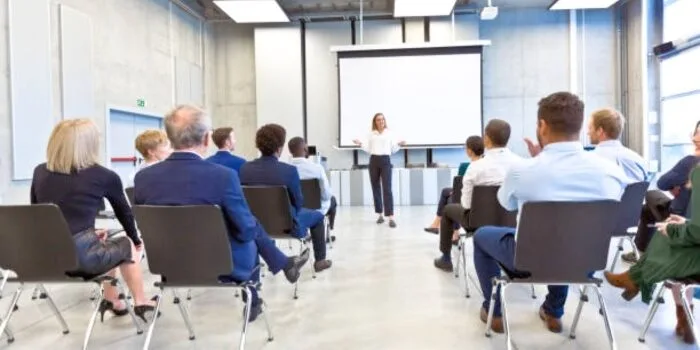When we talk about a conference, it generally refers to a meeting or series of meetings for discussion and exchange of ideas. However, when we’re talking about legislative processes, it takes on a different meaning. Now the question is: what is a conference committee?
A conference committee denotes a special, temporary panel consisting of members from both the House and Senate. It’s set up to iron out the differences between legislative bills passed by each chamber, with the goal of creating a unified version for final approval.
If you’re intrigued and wish to learn more. Then, go no further as we unravel the purpose, process, and significance of a conference committee in the legislative labyrinth.
A Quick Overview of A Conference
A conference brings people together to share ideas and knowledge on specific topics. Attendees gain valuable insights and build connections. Hosting a conference also offers businesses opportunities to showcase their expertise.
Organizing a successful conference requires careful planning and coordination of various elements. This includes selecting speakers, scheduling sessions, and ensuring smooth operations. Proper execution maximizes the experience and delivers the expected benefits of hosting a conference.
Conferences provide a platform for networking, learning, and professional growth. Participants leave with new ideas and meaningful contacts. Overall, a well-organized conference can significantly impact attendees and organizers.
What is a Conference Committee?
A Conference Committee plays a critical role within the legislative process, distinct from the general notion of a conference. Formed from members of both the House of Representatives and the Senate, this committee aims to reconcile differences in legislative bills, ensuring a unified approach before a bill is passed into law.
Each member brings a wealth of experience and knowledge from their respective chambers, contributing to a balanced and comprehensive dialogue. The composition of the committee is carefully selected, usually consisting of senior members with relevant expertise or interest in the bill’s subject matter. Discussions are structured to address conflicts and refine the proposed legislation.
International conferences often bring together experts from different backgrounds to discuss complex topics and share insights on pressing global issues. If the conference is a global event like conferences in Canada, it serves as a platform for experts to come together, exchange ideas, and work toward a common goal. Similarly, the Conference Committee functions as a space where policymakers negotiate terms, ensuring that the final version of a bill reflects the best interests of both legislative bodies.
Upon reaching a consensus, the Conference Committee drafts a report that includes the final version of the bill for both chambers to approve. This report must then be accepted by both the House and Senate without amendments, maintaining the integrity of the compromise reached. Their efforts highlight the importance of collaboration in decision-making processes.
The Responsibilities of Conference Committee Members
The success of a conference relies heavily on the dedicated work of its committee members. Each member plays a crucial role in ensuring everything runs smoothly. Below are the key responsibilities of conference committee members:
- Negotiating Differences: Members are tasked with identifying and resolving discrepancies between House and Senate bill versions. They work collaboratively, aiming for a compromise that honors both perspectives.
- Drafting a Final Bill: After negotiations, they prepare a unified bill version, ensuring it aligns with both chambers’ intentions. This document reflects the consensus reached during their discussions.
- Writing a Conference Report: Committee members compile a report detailing the final bill and the negotiation process. This report, crucial for transparency, is presented to both the House and Senate for approval.
- Liaising Between Chambers: They act as intermediaries, facilitating communication and understanding between the House and Senate. Their role is crucial in maintaining a cohesive legislative process.
- Ensuring Compliance: Members ensure the final bill complies with legislative and procedural rules. They safeguard the integrity of the law-making process through meticulous scrutiny.
The responsibilities of the conference committee members are essential for bridging gaps between different legislative visions. Their diligent work ensures that the final laws are comprehensive, balanced, and reflective of collective wisdom. Having a better understanding of these roles gives you a better sense of how the legislative process works.
Can Anyone Become a Conference Committee Member?
No, not everyone can become a conference committee member. It requires specific skills, experience, and a commitment to responsibilities. Committee members play a crucial role in ensuring the event’s success, so meeting certain criteria is essential. Below are the key requirements for becoming a conference committee member:
Legislative Experience
Members typically have considerable experience in legislation, often with specific relevance to the bill in question. Their background allows them to understand complex legislative details and negotiate effectively. Experience also helps in understanding both chambers’ perspectives, making the reconciliation process smoother. Seniority can play a role in selection, with longer-serving members often preferred.
Expertise in the Bill’s Subject
Committee members usually possess deep knowledge or interest in the bill’s subject matter. This expertise ensures informed discussions and decisions during the reconciliation process. It also aids in addressing technical or specialized aspects of the legislation. Members are often chosen from relevant standing committees.
Party Representation
The composition reflects the political balance of the House and Senate, mirroring the existing party ratios. This balance ensures that all viewpoints are considered, maintaining fairness in negotiations. Party leaders typically choose members based on loyalty, influence, and negotiation skills. Representation from both major parties is crucial for the committee’s legitimacy and effectiveness.
Leadership and Negotiation Skills
Effective committee members are strong leaders and skilled negotiators. They must communicate effectively, bridge differences, and forge compromises between opposing viewpoints. Their ability to navigate complex political dynamics is crucial for reaching a consensus. Leadership also involves guiding the committee toward a unanimous decision acceptable to both chambers.
Becoming a member of a conference committee requires a blend of experience, expertise, political acumen, and negotiation skills. It’s a role that demands not only a deep understanding of legislative processes but also the ability to work collaboratively and decisively under pressure.
Who can Assist the Conference Committee?
The success of a conference often relies on a well-supported committee. Various professionals can assist in making the event run smoothly. Their contributions can help manage tasks effectively and ensure everything is organized.
Conference Coordinator
A Conference Coordinator plays a key role in assisting the committee. They manage schedules, handle logistics, and oversee event operations. To ensure a smooth event execution, the role of conference coordinator involves coordinating all aspects of it. Their expertise in event planning is invaluable for ensuring everything runs seamlessly.
Administrative Support Staff
Administrative support staff handle essential tasks like managing registrations and processing paperwork. They keep track of deadlines and help with data entry. This support is crucial for keeping everything organized and on schedule. Their efficiency helps the committee focus on larger tasks.
Technical Support Team
The Technical Support Team ensures that all audio-visual equipment functions correctly. They set up and test the technology before the event starts. Their expertise minimizes technical issues during the conference. Reliable technical support prevents disruptions.
Volunteer Staff
Volunteer staff assist with various on-site tasks during the event. They help with registration, guide attendees, and manage logistics. Volunteers are essential for maintaining smooth operations throughout the conference. Their willingness to contribute is valuable for a successful event.
Marketing and PR Professionals
Marketing and PR professionals help promote the conference to attract attendees. They create marketing materials, manage social media, and handle public relations. Their work increases visibility and boosts attendance. Effective marketing ensures that the conference reaches its target audience.
Pros and Cons of Being a Conference Committee Member
Evaluating any situation or decision often involves weighing its pros and cons. It’s like making a sandwich. You need both bread and filling to make it complete. Here, we’ll break down the advantages and disadvantages of a hypothetical scenario, giving you both sides of the story.
Pros
- Increases efficiency by streamlining decision-making processes.
- Enhances collaboration, bringing diverse perspectives together.
- Promotes innovation through the combination of different ideas.
- Expands network opportunities by connecting various stakeholders.
- Improves learning by exposing individuals to new concepts.
- Boosts problem-solving capabilities with collective brainstorming.
- Offers personal growth through challenges and teamwork.
Cons
- Can lead to decision fatigue due to too many choices.
- Risks of groupthink, stifling individual creativity and dissent.
- May increase costs due to the need for additional resources.
While there are several benefits to consider, such as increased efficiency and innovation, there are also notable drawbacks, like the risk of groupthink and potential for conflict. It’s about finding the right balance to maximize the positives while mitigating the drawbacks.
FAQs about What Is a Conference Committee?
It can be tough to figure out the legislative landscape, especially when it comes to committee roles. Here are some answers to frequently asked questions about conference committees:
When Is a Conference Committee Formed?
It is formed when both the House and Senate have passed different versions of the same legislative bill. The committee is established to negotiate and reconcile these differences, creating a unified bill for both chambers to approve.
Who Selects the Members of A Conference Committee?
Members are usually appointed by the Speaker of the House and the Senate Majority Leader. The selection is typically based on members’ expertise, seniority, and involvement with the bill in question.
How Many Members Are in A Conference Committee?
The number of members can vary, but typically there are an equal number from both the House and Senate. The exact number is determined by the leaders of each chamber and can depend on the importance and complexity of the bill.
What Happens if The Conference Committee Reaches an Agreement?
If an agreement is reached, the committee drafts a conference report containing the final version of the bill. This report is then presented to both the House and Senate for approval without amendments.
Can the Public Attend Conference Committee Meetings?
While some conference committee meetings may be open to the public, others might be closed, especially during the negotiation of sensitive or controversial issues. The openness depends on the rules of each chamber and the discretion of the committee members.
How Long Does a Conference Committee Have to Reach an Agreement?
There is no set time limit. The duration can vary widely depending on the complexity of the bill and the differences between the House and Senate versions. However, due to legislative deadlines, there is often a sense of urgency.
What Role Do Conference Committees Play in The Legislative Process?
Conference committees play a crucial role in the legislative process by facilitating compromise and ensuring that a final, unified bill can be passed by both chambers. They help streamline potential conflicts and enable legislation to move forward.
Final Considerations
There has been a great deal of enlightenment on the journey through the legislative labyrinth. The role and responsibilities outlined show the pivotal nature of a conference committee in merging differing legal visions into a cohesive law.
The concept of what is a conference committee helps demystify a complex part of the governmental process, revealing its essential function in crafting legislation that reflects a balanced viewpoint.
This insight not only enhances our comprehension of political procedures but also underscores the importance of collaboration and compromise in the legislative journey. Engaging with this concept allows us to appreciate the intricate dance of democracy in action.








